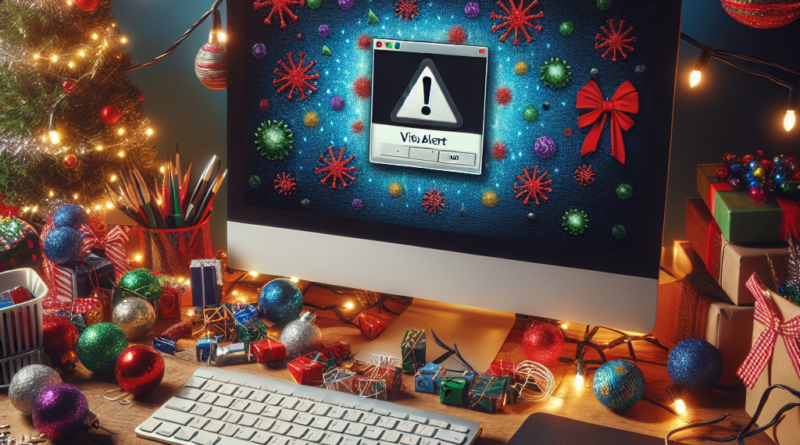Hello, Your Computer Has a Virus: A Guide to Safe Holiday Shopping
As the shimmer of the winter season begins to sparkle, your anticipation for the festive holiday shopping may be fraught with uncertainty, particularly concerning the thorny issue of cyber security. “Hello, Your Computer Has a Virus: A Guide to Safe Holiday Shopping,” aims to alleviate these concerns by providing a robust blueprint for purchasing the best, yet practical computers as Christmas and holiday presents, free from the looming shadow of malicious software. A virtual prowler may not be the kind of guest you’re hoping will surprise you this holiday, however, it is essential to exercise vigilance and inform yourself with secure transaction strategies. Indeed, safeguarding your computer is just as important as safeguarding your holiday cheer.
Understanding Computer Viruses
The term ‘computer virus’ may evoke a sense of dread. If you’ve ever experienced the frustration of compromised digital information, that dread is certainly valid. Essentially, a computer virus is a piece of code or a program designed to disrupt your computer’s normal functioning, or, in more malicious cases, steal or destroy data. It’s akin to a biological virus that can replicate, with its primary objective being to infect as many systems as possible.
Defining what a computer virus is
A computer virus is a malicious software program that replicates by replicating itself or by infesting other code or documents with its script. When this replication succeeds, the affected areas are then said to be ‘infected’.
The origins and evolution of computer viruses
The first computer virus was created in the early 1970s and was named “Creeper virus,” which infected mainframes on ARPANET. Since then, viruses have evolved in complexity and damage potential, with thousands of new ones discovered every year.
Different types of computer viruses
There are different types of computer viruses, including boot sector viruses, file infector viruses, and macro viruses among many others. Each type of virus acts differently and affects differing aspects of a computer’s operation.
Effects of computer viruses on your machine
A computer virus can cause several issues, including compromised system performance, data theft, file corruption, and even complete system failure. The effects can range from the annoying pop-ups to catastrophic data loss.
How Viruses Affect Holiday Shopping
The holiday season is a prime time for digital shoppers, and as e-commerce continues to rise, so does the risk of encountering a computer virus.
Impact on online shopping experience
The presence of a computer virus can cause significant disruption to your online shopping experience, potentially slowing down your computer, forcing sudden system restarts or sending erroneous data during transactions.
Potential financial risks and data loss
Should a virus infect your computer during the holiday shopping rush, it could steal sensitive data, such as your banking information, leading to financial loss.
Increased vulnerability during high-traffic periods
During high-traffic periods like the holidays, the risk of a computer virus infection increases due to the higher likelihood of encountering a disguised harmful link or downloading a seemingly legitimate but corrupted file.
Recognizing Signs of Computer Viruses
Just as with health ailments, early recognition of a computer virus can significantly reduce its potential damage.
Strange computer behavior
Your computer unexpectedly shutting down or restarting, or applications not working correctly can be an indication of a virus infection.
Unexpected pop-ups and ads
The appearance of annoying pop-ups or unanticipated advertisements could mean a virus is present and trying to lure you into a further trap.
Slow internet performance
Persistently slow internet, despite a strong connection, could signal that a virus is consuming significant system resources.
Unauthorized access to personal information
If you notice unusual account activity or suspicious transactions, these could be symptoms of a computer virus that has compromised your personal data.

Practical and Expensive Computers Susceptible to Viruses
Computers, regardless of their cost or brand, find themselves susceptible to viruses.
Impact of viruses on high-end computers
Even expensive, high-end computers can be crippled by a damaging virus, as such threats do not discriminate based on the cost or brand of a computer.
Comparing effects of viruses on various brands
While some brands may tout their resistance to viruses, the reality is that all are susceptible to various forms of malware, including viruses.
Assessing susceptibility of practical computers to viruses
Practical or budget computers, just like their premium counterparts, are susceptible to viruses. The risk level depends more on the behavior of the user and the protective measures taken rather than the cost of the computer itself.
Effective Virus Protection Measures
Defending against, or at least reducing the risk of, a computer virus infection primarily involves employing the right software and behavior.
Importance of having an antivirus software
Having a robust antivirus software is a critical first-line defense against computer viruses. These programs actively monitor for suspicious behavior and can often neutralize threats before they inflict damage.
Review of best antivirus softwares
While there are numerous antivirus software options available, some consistently receive top ratings, such as McAfee, Norton, or BitDefender, renowned for their comprehensive protection against a wide array of threats, including viruses.
Steps to take after detecting a virus
Upon detecting a virus, it’s vital first to disconnect from the internet, effectively isolating your computer and preventing the virus from spreading or communicating with its host. Running a full system scan using your antivirus software is the next advisable step.
Safe Online Shopping Practices during Holidays
Online shopping, particularly during the hustle and bustle of the holiday season, should be performed with caution.
How to recognize and avoid phishing scams
Phishing scams often involve seemingly genuine emails or websites designed to steal your personal information. Look out for misspellings, fishy email addresses, and unsolicited requests for personal information, as these are likely phishing attempts.
Importance of secure payment methods
Opting for secure payment methods, such as credit cards or secure third-party payment services, can provide layers of protection during online transactions.
Keeping software and applications updated
Regularly updating your computer system and applications ensures that patches or updates designed to secure vulnerabilities are applied, reducing the risk of virus infection.
Protecting personal data while shopping online
Never share personal details over an unsecured network, and always be skeptical of unsolicited requests for such data.
Guidelines to Keep Your Computer Virus-Free during the Holidays
Several practices will greatly reduce the chances of your computer getting infected over the holiday season.
Setting strong and unique passwords
Having robust and unique passwords can make it difficult for viruses and hackers to compromise your accounts.
Beware of suspicious emails and pop-ups
Always exercise caution when dealing with unexpected emails or pop-ups, as they could be disguised viruses.
Ensuring secure network connections
Using secure, password-protected networks, ideally Virtual Private Networks (VPNs), can reduce the risk of virus infection.
Regularly updating and scanning your machine
Keeping your machine updated and regularly scanning for potential threats is crucial to keeping it virus-free.
Holiday Computer Shopping Guide
When shopping for a new computer during the holiday season, several factors should be considered.
Best computers to consider for holiday gifts
Choosing the best computers for holiday gifts often depends on the recipient’s needs, such as gaming, design work, or general use.
Comparing price ranges and specifications
Computers cover a wide range of prices and specifications. Higher-priced computers might have better overall performance, but affordable options can also provide substantial value.
Where to find reliable computer deals during the holidays
Look for holiday deals from reputable computer retailers, both online and in physical stores. Always verify the authenticity of the retailer and the product before making a purchase.
Computer Maintenance and Health during Holidays
Even during the festive season, the digital health of your computer should not be neglected.
Preventive measures against computer viruses and malware
Strong antivirus software and cautious online behavior, such as avoiding suspicious links, make for good preventive measures against viruses and malware.
Useful tips for maintaining computer speed and performance
Regular system updates, clearing system clutter, and running regular scans can maintain, if not improve, your computer’s speed and performance.
Understanding the importance of data backup
Regular data backups can ensure that, even in the event of a virus infection, your precious data can be recovered.
Dealing with a Computer Virus Infection
Despite best practices, there’s always a chance your computer may become infected by a virus.
Procedures to follow when your computer is infected
Upon detecting a virus, stop all online activity, disconnect from the internet and run a complete system scan using your antivirus software.
Determining the right computer professional to fix the problem
If the situation becomes highly severe, seek professional assistance. A reputable computer technician or a trusted service center can perform advanced virus removal.
Coping with data loss and restoring your machine
If you lose data due to a virus infection, restore it from a recent backup if available. If no backup is available, professional data recovery services may be able to help.
Avoiding future virus infections
Once a crisis is averted, take steps to avoid future virus infections, including having robust antivirus software, setting strong and unique passwords, and maintaining regular system updates and scans.

